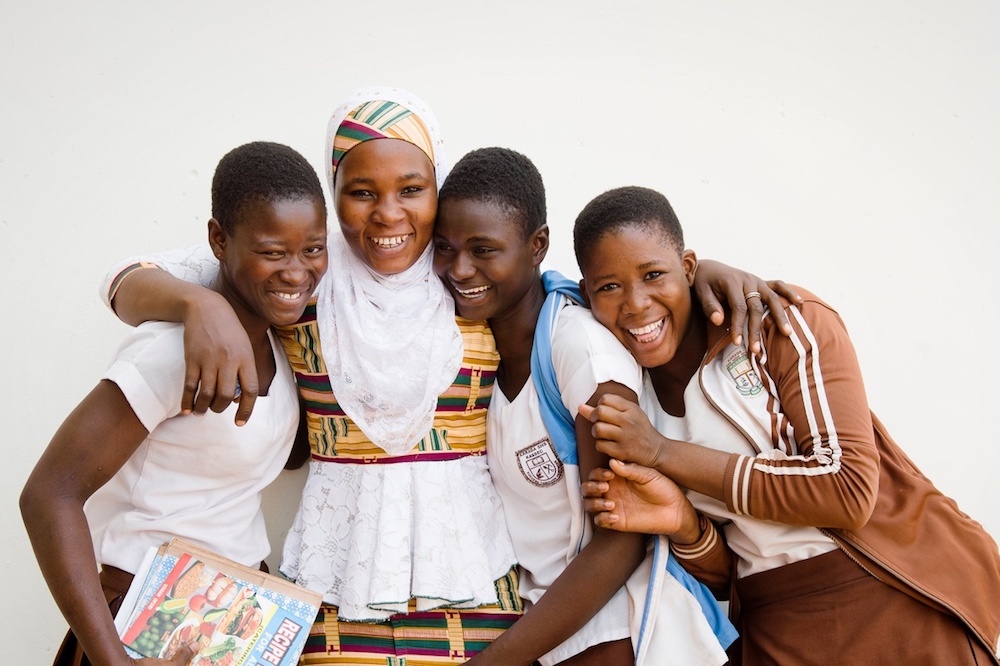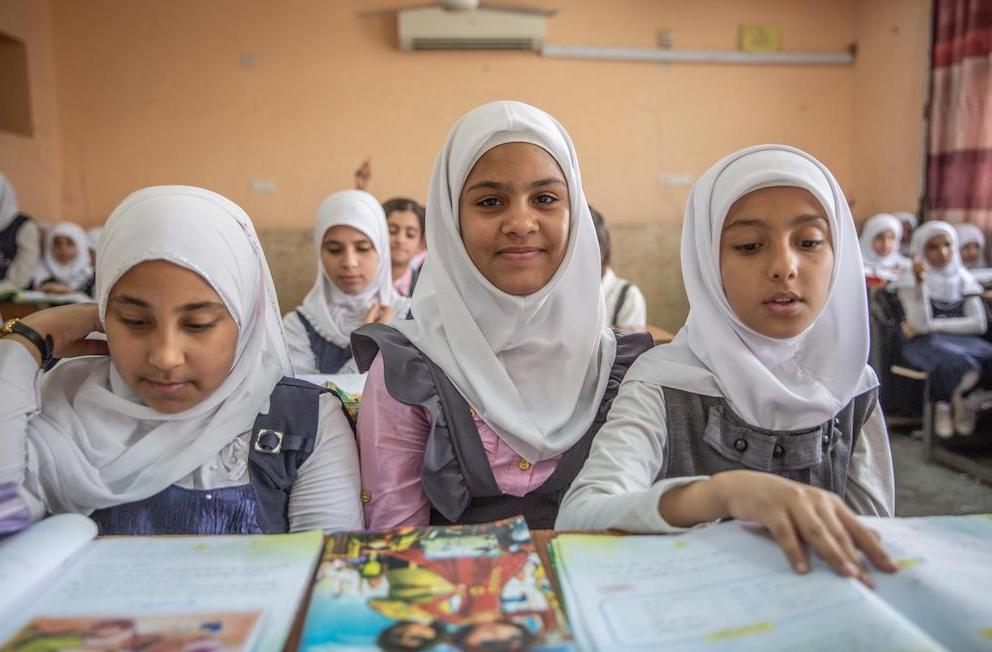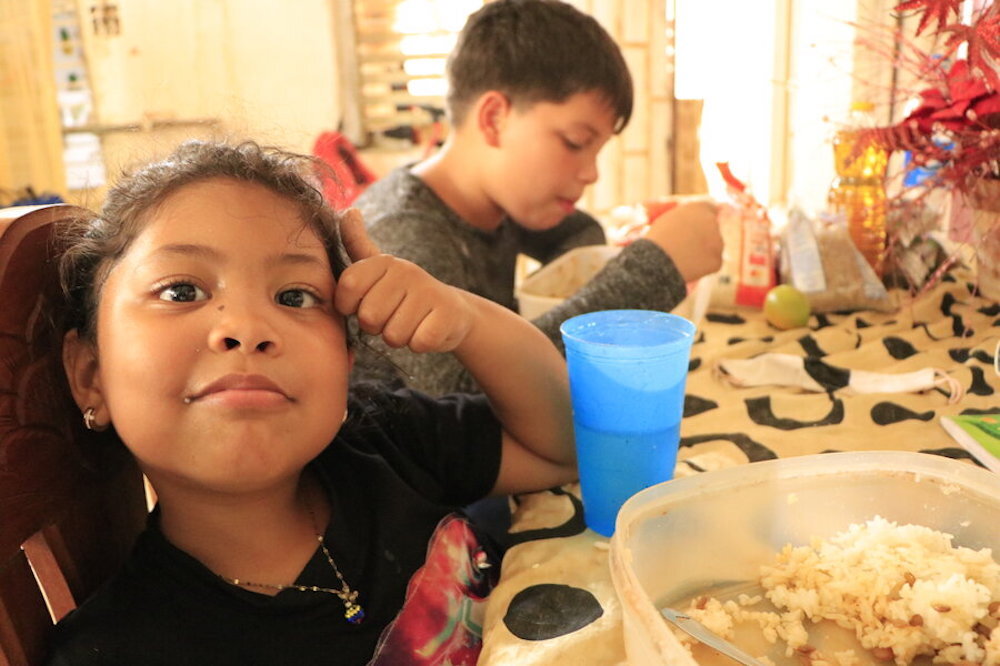
Five things you need to know this week about global education

Girls' education, Refugees and internally displaced people
An NGO that supports education for disadvantaged girls has won a $2.5m humanitarian prize - plus the launch of integrated education and immunisation projects.
Girls' education NGO wins $2.5m prize
The world’s largest humanitarian award for non-profit organisations, which comes with $2.5 million of funding, has been given to CAMFED, the Campaign for Female Education.
The 2021 Conrad N. Hilton Humanitarian Prize recognises the amazing work of CAMFED, which has supported more than 4.8 million disadvantaged students at thousands of schools in Ghana, Malawi, Tanzania, Zambia and Zimbabwe.
“CAMFED has revolutionised how girls’ education is delivered, tapping into local expertise in a way that is sustainable and scalable,” said Peter Laugharn, President and CEO of the Conrad N. Hilton Foundation.
“Further, the pandemic has had a catastrophic effect on families and girls, with estimates that 11 million girls may not return to school as a result of the crisis. The time for the global community to learn from this model is now.”
Congratulations to the 2021 #HiltonPrize recipient @Camfed! We are proud to honor this incredible organization supporting girls to learn, thrive and lead change in their own communities: https://t.co/2wP4y0EDny pic.twitter.com/8kvBG4MnLK
— Hilton Foundation (@hiltonfound) August 4, 2021
CAMFED said the $2.5 million prize will be used to help grow the CAMFED Association to 280,000 action-oriented women leaders. Angeline Murimirwa, CAMFED Executive Director – Africa, said: “We are thrilled to have this recognition at this critical moment.
“This prize belongs to our communities, for rallying around the education and leadership of young women who know intimately what poverty and exclusion feel like, and what it takes for girls to succeed.”
CAMFED was founded in 1993 – initially as a programme for just 32 girls in two schools in Zimbabwe. It now supports students in 6,787 schools.
Learning boost for displaced children in Iraq

A three-year programme will help to deliver education to 192,000 displaced children and youth in Iraq.
An initial seed-funding grant of $12.5 million from Education Cannot Wait will reach 36,500 girls and boys and will seek to mobilise a further $35.5 million for the rest of the programme.
It aims to support 250 schools and learning centres across the Central Iraq and Kurdistan regions. Of the beneficiaries, 35% will be Syrian refugees, 30% returnees to Iraq, 25% internally displaced and 10% from host communities.
Girls will make up 60% of those to be reached and children with disabilities will comprise 10%.
Projects combine education and vaccines
TODAY: EAA in partnership with @gavi with support from @qatar_fund have launched two new integrated education & immunisation projects in ?? and ??, working to address key barriers to vaccination in the region alongside @UNICEFKenya & @Save_ChildrenET #EAC https://t.co/9zkQZmXyl7 pic.twitter.com/z7rUeLpMv7
— Education Above All Foundation (@EAA_Foundation) August 4, 2021
Two integrated education and immunisation projects have been launched in Ethiopia and Kenya by the Education Above All (EAA) Foundation and Gavi, the Vaccine Alliance.
This is an expansion of their partnership aimed at supporting health, development and education access in some of the world’s most marginalised communities.
The initiative in Ethiopia aims to increase uptake of HPV vaccination among girls aged 14 and child vaccination among children under one – reaching more than 108,000 children.
The Kenya immunisation project intersects with EAA’s ongoing education project with UNICEF, which will reach 257,000 girls in and out of school.
Take-home meals for Venezuelan children

Venezuelan children will get nutritious meals from the World Food Programme (WFP / Alexis Masciarelli)
The World Food Programme has launched its school meals programme in crisis-torn Venezuela and wants to reach 185,000 pre-school and school students by the end of this year and 1.5 million by 2023.
Take-home meals of rice and lentils will be distributed while schools are closed due to the pandemic. When classes restart, WFP will switch to serving nutritious hot meals at schools.
The first rations were handed out in the state of Falcon. Susana Rico, WFP Representative in Venezuela, said: “We are reaching these vulnerable children at a critical stage of their lives when their brains and bodies need nutritious food to develop to their full potential.”
Venezuela has suffered an economic and refugee crisis, made worse by the effects of Covid-19.
Beirut blast schools still being rebuilt
Manal was a student at the UNRWA Jalil School which was damaged in the #BeirutExplosion.
“The impact of the explosion affected me…This prompted me to move alongside the Lebanese people to heal the wounds of #Beirut. I feel a sense of mutual solidarity.”https://t.co/N1L6CEzqmN
— UNRWA (@UNRWA) August 4, 2021
One year after the massive August 4 explosions that devastated parts of the Lebanese capital Beirut and left 300,000 people homeless, many schools are still being rebuilt or replaced.
About 85,000 students had their education disrupted – with more than 220 schools damaged or destroyed, along with 20 vocational training centres and 32 universities.
UNESCO was made responsible for leading and coordinating efforts to rehabilitate the schools – among them 75 public schools and 20 private schools.
Many schools also lost most of their teaching materials and several school libraries were destroyed. Souha Choueiri, head of Zahrat al-Ihsan School, said: “The double blast affected the school on several levels.”
More news

